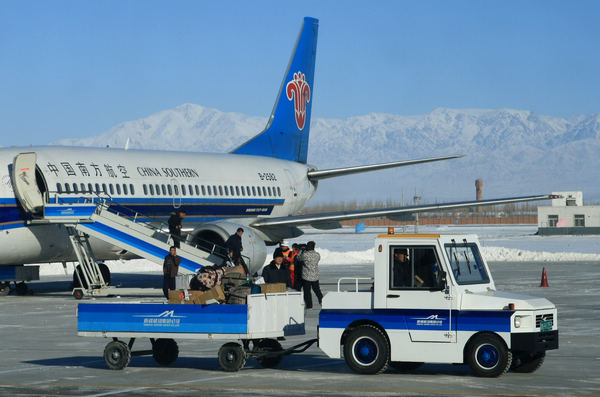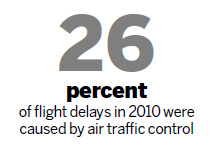Society
Air Force spares more space
By Tan Zongyang (China Daily)
Updated: 2011-06-15 08:10
 |
Large Medium Small |
|
 A luggage car takes baggage from a plane at the airport in Hami, the Xinjiang Uygur autonomous region, in this file photo. The airport is for both military and civil use. [Cai Zengle / for China Daily] |
BEIJING - New measures to ease delayed departures for civil aviation may soon take flight, an airspace regulation expert said.
The People's Liberation Army Air Force, the country's airspace regulator, will work with local authorities to shift flights to less busy hours, shorten the interval between flights and extend the time airspace is open, an unnamed airspace official told Xinhua News Agency on Monday.
|
||||
"In 2010, the average delay of domestic flights increased to one hour. Air traffic jams have been frequently seen either at air hubs in Beijing, Shanghai, Guangzhou or at the airports in second-tier cities such as Dalian, Qingdao, Xiamen, Chengdu and Xi'an."
A survey conducted by the Civil Aviation Administration of China found that carrier operation and management accounted for 42 percent of delays, while air traffic control - as a result of air traffic congestion in limited airspace - was responsible for 26 percent of delays.
Military activities led to 7 percent of flight delays.
|
 |
Li Jiaxiang, director of the administration, said in February that limited national airspace was one of the major reasons for flight delays last year.
According to statistics provided by the national lab on airspace technology, about one-third of the airspace in everyday use is for civilian flights.
The Air Force has announced it will spare six military airports for civilian use, or mixed military and civilian use, over the next five years. It has also modified airspace in hundreds of places that were only used for military flight training.
"Airspace has long been a bottleneck that restricted the development of civil aviation," Geng Shuxiang, dean of the business management department at the Civil Aviation Management Institution of China, told China Daily.
She said the airspace available for civil use could not keep up with the country's rapidly increasing carriers that have gradually jammed the country's airspace.
Geng hailed the move, as it was the first time the Air Force took a clear stand to initiate such measures to favor civil flights, which indicates a more favorable airspace policy in the future.
"Technically speaking, those measures can alleviate the flight delay problem as long as the Air Force shows its willingness," she said.
| 分享按鈕 |


